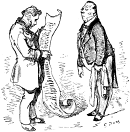Copy editor (with time machine) needed.
Dear Word Detective: In Craig Wilson’s September 12, 2007 column in USA Today, he quoted liberally from a new book of quotations compiled by one Elise Lufkin. The book is called “Not Bartlett’s.” Here’s Lufkin’s quote from Mark Twain: “Sometimes I wonder whether the world is being run by smart people who are putting us on, or by imbeciles who really mean it.” Clever and pithy, but I’m suspicious that the included phrase “who are putting us on” wasn’t yet current in Mark Twain’s time. I’ve tried doing Internet research on it, and I did find the quote attributed to Twain in at least one additional web site (what you might call a “site cite sighting”) but I continue to have my doubts. Can you trace back when “putting me on” became what it is today? — Jerome Norris.
That’s a good question (or, as Shakespeare once put it, “Totally awesome question, dude!”). “To put someone on” means, of course, “to pretend, to conduct a ruse or a hoax, often as a joke” (“Has it ever occurred to you, Oedipa, that somebody’s putting you on? That this is all a hoax?”, Thomas Pynchon, The Crying of Lot 49, 1966). “Put”  itself is, as one might suspect, a very old word, derived from the Old English “putian,” but where that Old English word came from is a mystery. As the centuries passed “put” developed a variety of meanings reflecting the general sense of “push” or “place,” and began to sprout figurative meanings as well. Many of these are older than one might suspect. “To put down,” meaning to snub or insult, for instance, dates back to around 1400.
itself is, as one might suspect, a very old word, derived from the Old English “putian,” but where that Old English word came from is a mystery. As the centuries passed “put” developed a variety of meanings reflecting the general sense of “push” or “place,” and began to sprout figurative meanings as well. Many of these are older than one might suspect. “To put down,” meaning to snub or insult, for instance, dates back to around 1400.
As for that quotation attributed to Mark Twain, there are really two questions: could he have said it, and did he actually say it? Unfortunately, there is no simple answer to either question. “To put on” meaning “to feign or pretend” (probably from donning a disguise or costume in order to deceive) dates back to at least the 17th century, well before Twain’s time. But the form in which it was commonly used prior to the 1950s was “to put on [something]” with the “something” being the object of the verbal phrase “put on” (“That voice is put on,” 1806). The earliest written attestation of the form “put someone on,” with the object of the verb being the deceived person, dates only to 1958. So Twain saying “putting us on” is very unlikely, although not absolutely impossible.
As to the second question, I found about 19,000 instances of that exact quotation online via Google, but exactly zero occurrences in several reputable collections of quotations. Given that Twain was the source of dozens of famous quotations, such an omission seems unlikely. Far more likely is that someone fabricated the quote and attached Twain’s name, it spread out over the internet, and Ms. Lufkin didn’t bother to check its provenance before she stuck it in her book. I wish I were more shocked by such a possibility.
Twain, incidentally, is often credited with things he didn’t say, including “There are three kinds of lies: lies, damn lies, and statistics,” which Twain himself credited to Benjamin Disraeli. The debunking site Snopes.com, in fact, devotes an entire page to bogus Twain quotes at www.snopes.com/quotes/twain.asp.




I thought it meant putting someone on the wrong scent.
The “Twain” quote is actually from “The Peter Principle”.
“Putting on” in my vocabulary has always meant putting on airs. “Stop putting on, we all know the truth.” Is this not a common usage ?
“Sometimes I wonder whether the world is being run by smart people who are putting us on or by imbeciles who really mean it.”
? Laurence J. Peter, The Peter Principle
funny I came to this site in a search for the origin of this phrase and found you mistakenly attributed the quote to Mark Twain just like the post that started my search. I know that in Mark Twains time the phrase Putting me on or putting us on was not in use. I will search some more scholarly sites for the actual origin.
I am 80 years old (today is 5/24/16) and I vividly recall the expression “putting them on” came into mine and my brother’s (79) vocabularies in about 1960; certainly not before 1958. I was living in Chicago then and my brother and I were both recently married. We enjoyed “putting on” our younger and less “hip” wives for sport when we were all together. Pretty immature and guaranteed to drive a marriage to the rocks if not brought to a screeching halt.
I just ran across the Mark Twain “quote” a few minutes ago. It had a phony ring that led me to this site.
There is of course the British equivalent of “you’re putting me on,” which is “you’re having me on.” Does anyone know which version came first, or why the difference in the two. One might hope the answer to that question might throw some light on the origins of the phrase…..
Yes. The first time I heard it was The Peter Principle. The historical dating of the phrase “putting someone on” to mean fooling them to the 1950’s makes Dr. Peter a plausible candidate for first attribution.
When was the phrase “Putting someone on” first used? Is it a 20th Century invention?
I thought I remembered it in Twain books, possibly Life on the Mississippi, “putting on aires.”